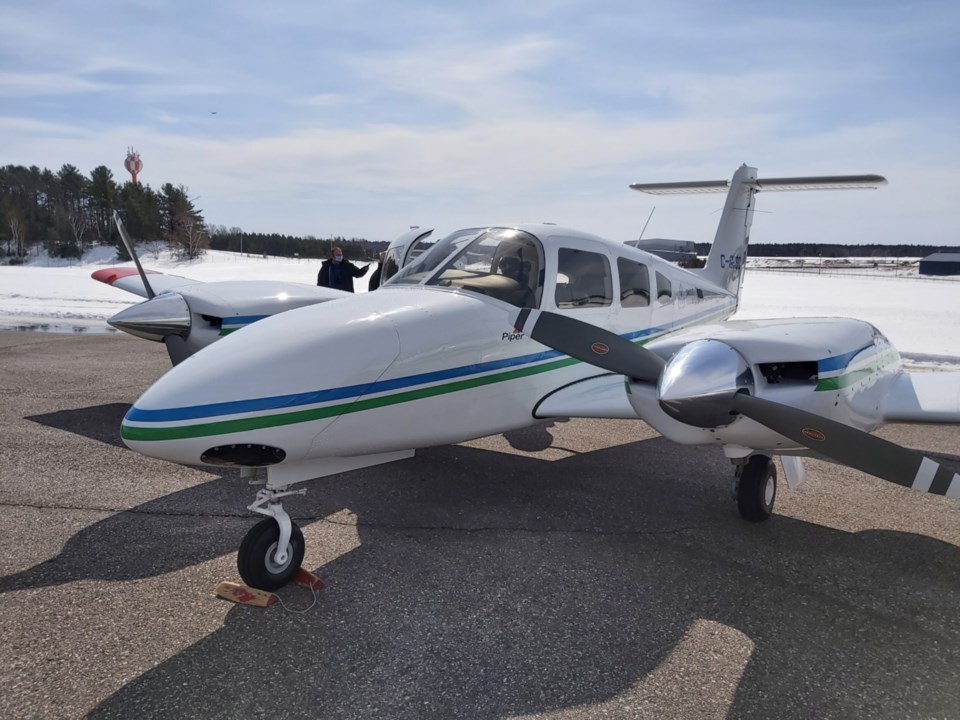Having faced challenges posed by the COVID-19 pandemic, causing Sault College to suspend first year admissions to its aviation program in the 2020-21 academic year, the school’s administrators now say the program appears ready to soar once again.
“The aviation program at Sault College continues to be one of our most popular and important programs. For this fall we have over 400 applications for 95 spots in the program," said Colin Kirkwood, Sault College vice president academic and research, addressing the college’s board of governors at its most recent virtually-held meeting.
The board recently approved purchase of a new four seat Piper Seminole twin-engined aircraft to be used in training the college’s aviation program students.
The Seminole, a $1.25 million aircraft, was purchased brand new from a U.S. factory and delivered to the college’s aviation site at the Sault Ste. Marie Airport in March.
It joins two other Zlin single-engined planes which were purchased and delivered to the program in the fall of 2020.
The addition of the Seminole plane to the Sault College aviation fleet, in particular, is of huge benefit in regard to multi-engined training, making aviation program students more marketable when they graduate.
There are now 15 aircraft (12 single engine and three twin-engined planes) in the aviation program fleet.
Sault College has experienced difficulties in getting its aviation students through the graduation door in recent times.
Apart from the suspension of first year admissions to its aviation program in the 2020-21 academic year due to COVID restrictions, the province-wide community college faculty strike of 2017 and the departure of at least one flight instructor for employment elsewhere in the once-booming aviation industry led to many students not being able to acquire enough flight hours necessary to complete the three-year Sault College aviation program, those students having to return for an unanticipated ‘fourth year.’
“We’ve made changes, improving the schedule to increase the consistency of flight training and we're bringing in some new faculty recently with airline experience, trying to align with what we see as the objectives of the Ministry,” said Greg Farish, Aviation Technology - Flight program chair, speaking to the board.
“The shut down last year due to the pandemic had a very significant impact and we are very disappointed that we had to defer the 2020 student enrolment. It was however done in the best interest of the current students, the future of the program and the success of future students. For the Fall of 2021 we are returning to normal levels of student admission. We have first ensured that all the deferred students were able to retain their spot in the program,” said Farish in a subsequent email to SooToday.
“We have created some powerful tools that allow us to better forecast the student flight training demand and the number of instructor staff that will be required. No forecast is perfect but we have greatly improved our ability to provide the flight training hours to meet our targets for student progress toward graduation. With the metrics we are tracking we can measure progress against the plan and adjust to proactively navigate to our targets. Since we started recalling students for flight training in August 2020 we have been tracking well to our student completion goals,” Farish said.
The addition of the new Piper Seminole twin-engined aircraft is a key component of the college’s plan to meet its goal to achieve completion targets for students as they reach their multi-engine and IFR (Instrument Flight Rules) training phases in the future, Farish added.
Despite the devastating harm the pandemic has caused the aviation industry, Farish said the industry, including major players such as Boeing "sees over the next 20 years a demand for over 700,000 new pilots. They see, and we do as well, this will be a temporary situation and the demand is going to be coming back very robustly.”
Farish said NAV Canada’s decision, announced April 15, to maintain air traffic control service at the Sault Ste. Marie Airport and the federal government’s May 13 announcement of over $9 million in funding from Transport Canada’s Airport Capital Assistance Program (ACAP) for infrastructure improvements at the airport will be of great benefit to the college’s flight training capacity.
